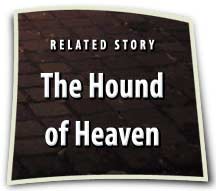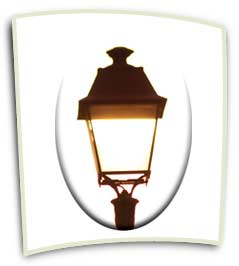
HEN I WAS A child I saw God as that great watchdog in the sky. The one who told Santa Claus I had been bad and deserved nothing but sticks and coal in my stocking. The one who gave me a tummyache when I stole green apples from the neighbors and ate them out behind the big cottonwood. He was like my parents, only with a better view. Uneasy and guilt-ridden, I asked myself, “Did He really see that? How am I going to mess up next? Nothing I do is right.” He was always there, waiting for me to step off base so He could tag me out.
I grew up and no longer believed in Santa Claus. Still, unable to shake off the conviction that God demanded that I behave perfectly, I walked more circumspectly just before Christmas.
It was all about me, wasn’t it? If there was any seeking to do, I would have to do the seeking. So I looked for Him in Scripture, in nature, at church, in other people. He was up there someplace, maybe even down here with the good people; but He was not with me, skulking about, hoping He didn’t notice the bag of sins I carried around. Always on the defensive, I expected Him to come charging out shouting, “What are you doing?”

But He surprised me. He didn’t shout in a voice like thunder, “How could you do such a thing? Get out of My sight.” He didn’t even ask, “What have you done?” Instead He came looking for me, asking, “Where are you?”
Was there a bigger, kinder, gentler God, who wanted to find me, encourage me, give me a leg up, help me to help myself?
When I read Francis Thompson’s poem The Hound of Heaven, I began to see God not as a watchdog at all, but as a great, coursing hound dogging the trail of His wayward children, never giving up, never discouraged by indifference or neglect or anger. I remembered something I read a long time ago: “The friends I seek are seeking me.” And I realized this applies to God as well. The God pursued is the God pursuing.
The story is told of a man who lost his keys in a dark place, but he went looking for them under the streetlight. When asked why he was looking there, he said: “Because it’s dark over where I lost them.”
God is seeking people where they are lost—not in some clean, well-lighted place, but in back allies, bars, city streets. He found Rahab in a brothel, the prodigal son in a pig pen, Jacob in a foreign country hiding from the brother whom he’d cheated out of his birthright. Overlooking the obvious character flaws in these people, the duplicity, the profligacy, the moral torpidity, God touched each of them on the shoulder, saying, “God wants you.” During World War II a recruiting poster showed Uncle Sam laying his hand on the shoulder of a young man, saying, “Uncle Sam wants you.” God is like that. Small matter if the young man is broke, out of work, an abject failure.
That He is a seeking God is told in parable and song, and in your story and mine. He is the merchant seeking the pearl of great price, the shepherd seeking the lost sheep, the woman, who having lost one piece of silver, lights a candle and sweeps the whole house, searching until she finds it.
Part of the wonder is that the ones He seeks to go on chosen errands may not be the best qualified, not the tallest, handsomest, or even most morally upright. Sometimes He sends also-rans, truculent misfits, or rebels. “Ye have not chosen me, but I have chosen you” (John 15:16).
Jonah felt the hand of God on his shoulder and heard a voice telling him to go to Nineveh and preach. No way was he going to Nineveh and preach. Not only was it dangerous, but it would certainly be futile to scatter the word of God before those heathen. So he did the only sensible thing. He ran. He went to Joppa and booked passage for Tarshish. Let God find him there! He could just get someone else to go on this crazy mission.
But although he thumbed his nose at God and ran, God found him. On shipboard, in the storm, in the belly of the great fish. Everywhere he turned, God was there.

A weary and worn down Jonah finally did go to Nineveh. He preached. The whole city put on sackcloth and ashes and called upon God. It was an evangelistic success. But not to Jonah. In the last frame, we see Jonah pouting on the east side of the city, wallowing in narcissistic pity. He could have been the man of the hour, rejoicing in the salvation of an entire city, 120,000 souls; but instead he remains focused on his own little self.
But me, what about me? How will this make me look?
Even then, God does not leave him but treats him kindly, patiently trying to reason with him.
This story is not so much about Jonah as about God, and it gives me a whole new dimension of God—His grace, His long-suffering, His mercy, His love. Not the watchdog in the sky, but the Hound of Heaven, tirelessly pursuing the lost and reluctant. Yearning for His errant children, He goes the second mile and the third and the fourth, never giving up. Even if I run and hide and turn my back on Him, He is right behind me.
Francis Thompson himself, author of The Hound of Heaven, was one of these lost sinners. Hiding from God, from himself—a seeming failure, he ran. Flunking out of medical school, declared unfit for the priesthood, as a last resort, he tried to join the military, but even there was rejected because of his drug habit. He made his way to London where he lived on the streets, selling newspapers, hawking pencils, holding horses, and becoming so shabby he was turned away from the public library.
There, sleeping on the streets of London, sick and dissolute, he “saw a vision of Jacob’s ladder pitched betwixt heaven and Charing Cross.” He was at the end of his rope, hanging on with one hand, the other reaching out, when a woman of the street found him and kept him alive with her charity.
By some miracle his poetry, written on scraps of paper, came to the attention of an editor who persuaded him to come off the streets, kick his laudanum habit, and write his poetry. “To be the poet of the return to nature is something, but I would be the poet of the return to God,” was his wish.
No matter how his flight or where, he could not get away from God. “Down the nights and down the days,” he wrote, “I fled Him . . . I hid from Him . . . from those strong Feet that followed, followed after.” Always God was right behind him, relentless in His pursuit. When he goes to ground at last, he hears a voice saying. “Rise, clasp my hand, and come. . . . Ah, fondest, blindest, weakest, I am He whom thou seekest.”* The metaphor of the Hound of Heaven enhanced and enlarged the nature of God for me. He is not remote, silent, and indifferent. Not hoping I will fail so He can pounce on me. Instead, no matter where I go or how far I run, He is searching me out. “Whither shall I go from thy spirit? Or whither shall I flee from thy presence? If I ascend up into heaven, thou art there: if I make my bed in hell, behold, thou art there.
If I take the wings of the morning and dwell in the uttermost parts of the sea, even there shall thy hand lead me, and thy right hand shall hold me” (Ps. 139:7-10).
Here is one of the mysteries of God that gives new insight and depth to our relationship. It is not that I am seeking Him (I have my own checkered motives), but that He is seeking me. Before I can call out to Him, He calls out to me, “Where are you?” As He found Adam and Eve, as He pursued the prodigal son, as He tracked down Jonah, He is hunting for me. Not to give openhanded gifts, not to save me from the petty irritations of life or its testing trials. He is seeking me out for the redemption of my soul.
__________
*Francis Thompson, The Hound of Heaven.
________________________________
Rosalie Hunt Mellor writes in the corner of the woods in Grand Rapids, Minnesota.

 HEN I WAS A child I saw God as that great watchdog in the sky. The one who told Santa Claus I had been bad and deserved nothing but sticks and coal in my stocking. The one who gave me a tummyache when I stole green apples from the neighbors and ate them out behind the big cottonwood. He was like my parents, only with a better view. Uneasy and guilt-ridden, I asked myself, “Did He really see that? How am I going to mess up next? Nothing I do is right.” He was always there, waiting for me to step off base so He could tag me out.
HEN I WAS A child I saw God as that great watchdog in the sky. The one who told Santa Claus I had been bad and deserved nothing but sticks and coal in my stocking. The one who gave me a tummyache when I stole green apples from the neighbors and ate them out behind the big cottonwood. He was like my parents, only with a better view. Uneasy and guilt-ridden, I asked myself, “Did He really see that? How am I going to mess up next? Nothing I do is right.” He was always there, waiting for me to step off base so He could tag me out. But He surprised me. He didn’t shout in a voice like thunder, “How could you do such a thing? Get out of My sight.” He didn’t even ask, “What have you done?” Instead He came looking for me, asking, “Where are you?”
But He surprised me. He didn’t shout in a voice like thunder, “How could you do such a thing? Get out of My sight.” He didn’t even ask, “What have you done?” Instead He came looking for me, asking, “Where are you?” A weary and worn down Jonah finally did go to Nineveh. He preached. The whole city put on sackcloth and ashes and called upon God. It was an evangelistic success. But not to Jonah. In the last frame, we see Jonah pouting on the east side of the city, wallowing in narcissistic pity. He could have been the man of the hour, rejoicing in the salvation of an entire city, 120,000 souls; but instead he remains focused on his own little self. But me, what about me? How will this make me look?
A weary and worn down Jonah finally did go to Nineveh. He preached. The whole city put on sackcloth and ashes and called upon God. It was an evangelistic success. But not to Jonah. In the last frame, we see Jonah pouting on the east side of the city, wallowing in narcissistic pity. He could have been the man of the hour, rejoicing in the salvation of an entire city, 120,000 souls; but instead he remains focused on his own little self. But me, what about me? How will this make me look?